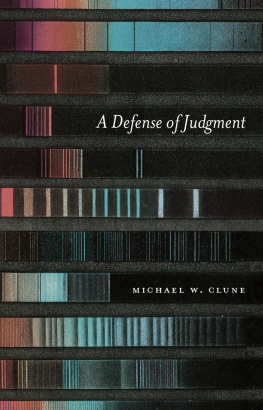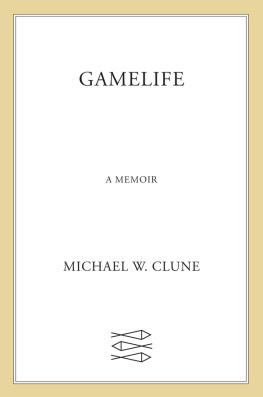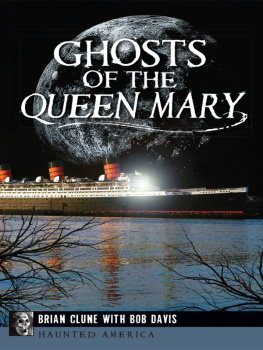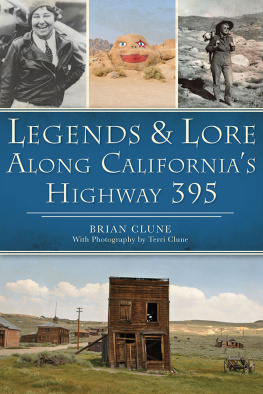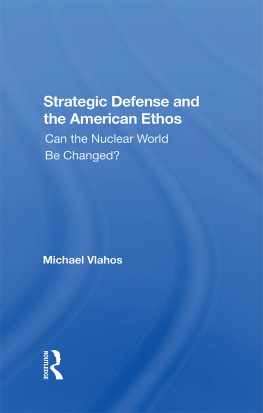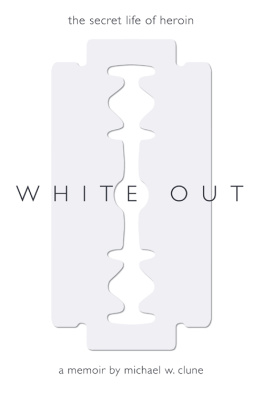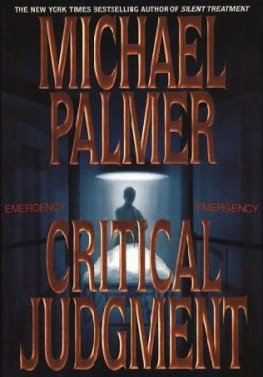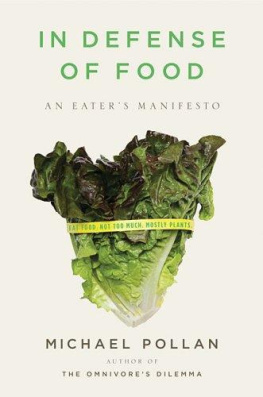Michael W. Clune - A Defense of Judgment
Here you can read online Michael W. Clune - A Defense of Judgment full text of the book (entire story) in english for free. Download pdf and epub, get meaning, cover and reviews about this ebook. year: 2021, publisher: University of Chicago Press, genre: Romance novel. Description of the work, (preface) as well as reviews are available. Best literature library LitArk.com created for fans of good reading and offers a wide selection of genres:
Romance novel
Science fiction
Adventure
Detective
Science
History
Home and family
Prose
Art
Politics
Computer
Non-fiction
Religion
Business
Children
Humor
Choose a favorite category and find really read worthwhile books. Enjoy immersion in the world of imagination, feel the emotions of the characters or learn something new for yourself, make an fascinating discovery.
- Book:A Defense of Judgment
- Author:
- Publisher:University of Chicago Press
- Genre:
- Year:2021
- Rating:5 / 5
- Favourites:Add to favourites
- Your mark:
- 100
- 1
- 2
- 3
- 4
- 5
A Defense of Judgment: summary, description and annotation
We offer to read an annotation, description, summary or preface (depends on what the author of the book "A Defense of Judgment" wrote himself). If you haven't found the necessary information about the book — write in the comments, we will try to find it.
A Defense of Judgment — read online for free the complete book (whole text) full work
Below is the text of the book, divided by pages. System saving the place of the last page read, allows you to conveniently read the book "A Defense of Judgment" online for free, without having to search again every time where you left off. Put a bookmark, and you can go to the page where you finished reading at any time.
Font size:
Interval:
Bookmark:
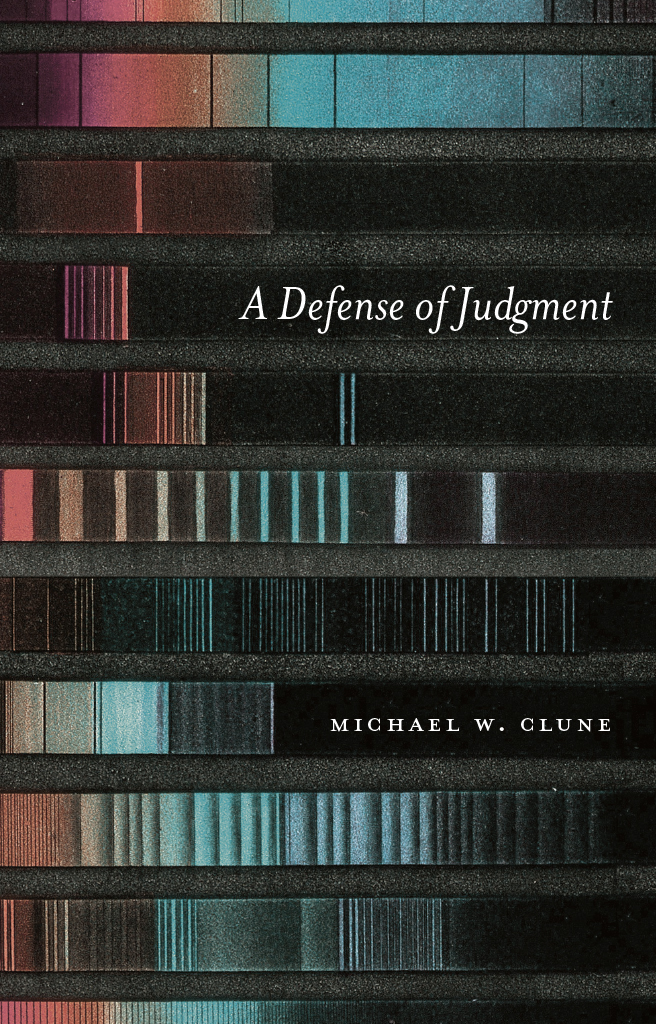
Michael W. Clune
The University of Chicago Press
CHICAGO & LONDON
The University of Chicago Press, Chicago 60637
The University of Chicago Press, Ltd., London
2021 by The University of Chicago
All rights reserved. No part of this book may be used or reproduced in any manner whatsoever without written permission, except in the case of brief quotations in critical articles and reviews. For more information, contact the University of Chicago Press, 1427 East 60th Street, Chicago, IL 60637.
Published 2021
Printed in the United States of America
29 28 27 26 25 24 23 22 21 20 1 2 3 4 5
ISBN-13: 978-0-226-65396-9 (cloth)
ISBN-13: 978-0-226-77015-4 (paper)
ISBN-13: 978-0-226-77029-1 (e-book)
DOI: https://doi.org/10.7208/chicago/9780226770291.001.0001
Library of Congress Cataloging-in-Publication Data
Names: Clune, Michael W., author.
Title: A defense of judgment / Michael W. Clune.
Description: Chicago : University of Chicago Press, 2021. | Includes bibliographical references and index.
Identifiers: LCCN 2020047074 | ISBN 9780226653969 (cloth) | ISBN 9780226770154 (paperback) | ISBN 9780226770291 (ebook)
Subjects: LCSH: Judgment (Aesthetics) | Criticism.
Classification: LCC PN81 .C684 2021 | DDC 801/.95dc23
LC record available at https://lccn.loc.gov/2020047074
 This paper meets the requirements of ANSI / NISO Z39.48-1992 (Permanence of Paper).
This paper meets the requirements of ANSI / NISO Z39.48-1992 (Permanence of Paper).
And the bulls head I took from mighty meats and bone
And stuck beside the wall.
Above the world I shook it, like a soldier of the truth:
Behold, here it is!
Here is that curly brow which once inflamed the crowds!
And horrified
I understood that I was seen by none:
That one must sow the eyes,
That the eye-sower must go!
Velemir Khlebnikov, The Lone Performer, trans. Gary Kern
Professors of literature make judgments about value. Literary scholarslike art historians, musicologists, and classicistssay to our students: These works are powerful, beautiful, surprising, strange, insightful. They are more worth your time and attention than others. Such claims are implicit in choosing what to include on a syllabus. And yet for several decades now, professors have felt unable to defend these claims. So we pretend were not making them. We bend over backward to disguise our syllabi, articles, and books as value neutral, as simply means for students to gain cultural or political or historical knowledge.
But this stance is incoherent. Its impossible to cordon off judgments about literary value from the practices of interpretation and analysis that constitute any viable model of literary expertise. If I judge that a certain poem contains a historical insight that cant be captured by a history textbook, or that a particular novel knows something about political dynamics that a student cant get from a work of political theory, then Im making a literary judgment. Im saying that it has value, not just for me but for everyone. This belief is what justifies my requiring students to read it. If I think students can get the same insights from a history or economics or sociology or philosophy course, then why should students bother with my class at all? Even a project as ostensibly value neutral as a study of the material composition of the paper that makes up a Shakespeare folio is indirectly dependent on our sense of the value and interest of Shakespeares writing. The absence of a defense of judgment paralyzes our capacity to defend our discipline at a time when it is threatened on many fronts.
Powerful barriers to acknowledging the central role of judgment in our professional practice have arisen over the past half century. They include the following widely shared, related but distinct, implicit and explicit claims:
- All judgments of artistic value are equal.
- Judgments of artistic value are subjective.
- Educated artistic judgment is primarily an expression of social status.
- Artistic judgment, expressing opinion rather than knowledge, is not a suitable subject of academic expertise.
- The artistic judgments of experts dont have a claim on those of nonexperts.
- The artistic judgments of experts necessarily codify racial and sexual prejudices.
- Expert judgments of art focus only on a narrow set of featuressuch as formand are thus unable to capture much of the social interest of art.
- In an ideal world, expert aesthetic judgment may be a valuable professional practice; but more urgent problems face our society and our profession, so now is not the time to prioritize judgment.
This book proceeds by exploring each of these objections, challenging them, and reversing them in a positive account of literary studies as an institution of aesthetic education and literature professors as experts in literary judgment. At the outset, I want to highlight something about these objections that may not be obvious. They present as exemplifying the modern, rational skepticism of traditional practices. But in fact, each of these objections to expert artistic judgment depends on a concealed alternative vision. To reject the claims or possibility of expert judgment is not to believe theres no way to decide on the value of artworks. It is to endorse a historically specific system of value judgment, a system in which all values are determined by consumer preference and coordinated by the market. As I will show, the skepticism about judgment arises with market culture, and it is enthroned as an intellectually dominating position only with the late nineteenth-century transition from classical to neoclassical economics. The idea that the value of artworks is entirely a matter of subjective opinion, without any public standard, is so counterintuitive that even after a century it has succeeded not in repressing aesthetic education but merely in forcing it to wear the mask of hypocrisy.
Yet this mask is disabling enough. Beneath it, the judgments made every day in every classroom by every literature professor are largely cut off from meaningful critique by peers, and they run the risk of decaying into authoritarianism. Professors inherit a rigid and largely static canon, the residue of a time when aesthetic judgments were still part of the public work of the profession. Thus, a writer like John Guillory can, in his spirited defense of literary education, come up with no value term more substantial than important. The importance of the classic works that still largely compose our syllabi is parasitic on a past regime of artistic judgment which we have no means of contesting on artistic grounds.
Among the losses inflicted by judgments retreat is the professions current blindness to its political possibilities. The fact that the resistance to judgment is historically and conceptually bound up with commercial culture endows the defense of judgment with an unprecedented political salience. The key feature of commercial culture in this context is its erection of consumer preference as the sole standard of value. Here it is useful to distinguish between two kinds of evaluative skepticism. Commercial culture, by declaring all preferences equal, gives me no reason to be skeptical about my own values. Aesthetic education, by denying that all preferences are equal, gives me reason to be skeptical about my existing values. The perspective developed by aesthetic education discourages me from identifying with the preferences generated by the commercial environment. It shows that it is possible to evaluate my existing values and to acquire new ones. By smothering this possibility under the aegis of a false egalitarianism, commercial culture prevents us from seeing aesthetic enrichment as a basic human need, which has the practical effect of restricting access to the wealthy. By hobbling aesthetic education, commercial culture restricts the creation and dissemination of alternative concepts, perceptions, and experiences.
Font size:
Interval:
Bookmark:
Similar books «A Defense of Judgment»
Look at similar books to A Defense of Judgment. We have selected literature similar in name and meaning in the hope of providing readers with more options to find new, interesting, not yet read works.
Discussion, reviews of the book A Defense of Judgment and just readers' own opinions. Leave your comments, write what you think about the work, its meaning or the main characters. Specify what exactly you liked and what you didn't like, and why you think so.

